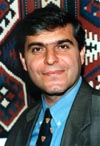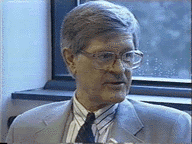|
 Richard Williams Bulliet, Columbia University
Richard Williams Bulliet, Columbia University
The
Osama bin Laden Videotape as Propaganda
Dr.
Bulliet received his Ph.D. from Harvard University and has taught
at Harvard and Berkeley. He served for twelve years as the Director
of the Middle East Institute.
His research
interests include history of Middle East and North Africa, the
history of technology, world history, and social history, and
the history of human-animal relations.
He is the author of books Islam: The View from the Edge,
The Camel and the Wheel, The Patricians of Nishapur, Conversion
to Islam in the Medieval Period, co-author of The Earth
and Its Peoples: A Global History, editor of The Columbia
University History of the Twentieth Century and co-editor
of The Encyclopedia of the Modern Middle East.
His most recent book, Islam:
The View from the Edge (Columbia University Press 1994)
deals with the ways in which localized Muslim communities have
constructed their own versions of Islam from the seventh century
until today, taking Iran as a case study.
|
|
 Fawaz
Gerges, Columbia University Fawaz
Gerges, Columbia University
Eavesdropping
on Osama bin Laden
Fawaz
A. Gerges, an adjunct professor at Columbia University, holds
the Christian A. Johnson Chair in International Affairs and
Middle Eastern Studies at Sarah Lawrence College in New York.
He is also a consultant and regular commentator for ABC. He
has also appeared on many television and radio programs throughout
the world, including CNN, CBS, NPR, BBC, The Charlie Rose
Show, LBC, and others.
Dr.
Gerges received his M.Sci. at London School of Economics and
was awarded a DPhil., from Oxford University. He taught at
Oxford and Harvard universities and was a research fellow
at Princeton University for two years.
His
special interests are Islam and the political process, fringe
Islamist movements, Arab politics, American foreign policy
in the Middle East, the modern history of the Middle East,
history of conflict, diplomacy and foreign policy, historical
sociology, and international relations.
He
has won several academic awards, one of which is a two-year
MacArthur Fellowship. He spent these two years conducting
field research on relations between the Islamist and the West
in six Arab countries.
He
is the author of America
and Political Islam: Clash of Interests Or Clash of Cultures?
(Cambridge University Press, 1999); and The Islamists and
the West: Ideology vs Pragmatism (Cambridge University
Press, forthcoming 2002); The Superpowers and the Middle
East: Regional and International Politics, 1955-1967 (Oxford
and Westview Press, 1994); and The Clinton Administration
Approach toward Islamist Movements (The Council on Foreign
Relations: New York, 1999).
His
articles and essays have appeared in Foreign Affairs, Foreign
Policy, The New York Times, The Washington Post, The Los Angeles
Times, The Christian Science Monitor, The International Herald
Tribune, The Nation, Survival, Harvard Journal of World Affairs,
The Oxford International Review, British Journal of Middle
Eastern Studies, The Middle East Journal, The Beirut Review,
Al-Mustaqbal Al-Arabi, Al Hayat, Al-Safir, Al-Nahar, Al-Mustaqbal,
and in other journals and anthologies.
|
|
 John
O. Voll, Georgetown University. John
O. Voll, Georgetown University.
Bin
Laden and the Logic of Power
Dr. Voll graduated from Dartmouth College and received his
Ph.D degree from Harvard University. He taught at University
of New Hampshire before becoming a professor of Islamic history
at Georgetown University with a joint appointment in the Center
for Muslim-Christian Understanding and in the University's
history department. He is a past president of the Middle East
Studies Association of North America and also of the New England
Historical Association.
His research interests include Islamic movements of revival
and reform in the modern era and the broader issues of the
history of renewal and reform movements in Islamic history.
His latest book, Makers
of Contemporary Islam, co-authored with John L. Esposito
was published this year. The second edition of his book Islam:
Continuity and Change in the Modern World appeared in
1994, and a study, Islam and Democracy, also co-authored
with John L. Esposito, was published in 1996. He is editor,
author, or co-author of five additional books. In addition,
he has published numerous articles and book chapters on modern
Islamic and Sudanese history.
In
1991 he received a Presidential Medal in recognition of scholarship
on Islam from President Husni Mubarak of Egypt.
|

